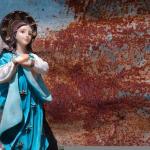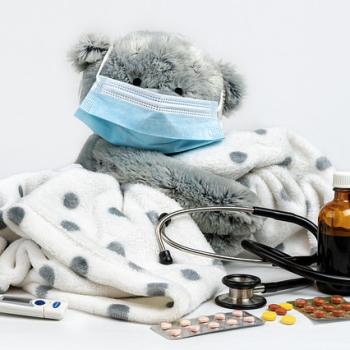
I took Adrienne swimming yesterday.
Adrienne is Rosie, my daughter whom I’ve introduced you to many times. We named her Adrienne Rose when she was born, intending to call her Adrienne. But at about six weeks old, we started calling her Rosie Toesie Pudding and Pie, and then Rosie Toes, and then Rosie. Everyone knew her as Rosie for the longest time. A few months ago she said she felt like more of an Adrienne and not a Rosie, so I’m trying to remember to say “Adrienne.” “Adrienne” is more grown-up than “Rosie.”
I kept on looking at her as she splashed in the pool– at how tall she’s grown, how she’s changing. And I worried. I was afraid.
Adrienne is turning eleven in just about two months. Eleven was the year I started puberty, with all the grace of a freight train crashing into a slaughterhouse. Eleven was the age when everything went wrong for me, and it’s no exaggeration to say I spent the rest of my life picking up the pieces.
Two months after I turned eleven, the combination of going to an abusive school, being spiritually abused in the Charismatic Renewal, and having an undiagnosed hormonal disorder saddled me with a severe case of anxiety that turned into OCD. This was poorly diagnosed and badly treated by a 90s child psychiatrist who didn’t understand what massive doses of SSRI antidepressants and sleep aids could do to a pre-teen. In addition to inappropriate medication, instead of psychotherapy, I got prayed over by the Charismatic community and the demons called out of me. That didn’t help a bit. My mother was mortified by my panic and eccentricity, but nothing she did could make it go away.
The next thing that happened was that my face broke out in pustules that were treated like leprosy. My mother was embarrassed by my skin. She tried every treatment in the drugstore to make me pretty again, but none of them worked. Finally she got my internist grandfather to write me a prescription for Retin-a, which made my face feel like it was on fire. Sometimes, when we were sitting watching television together, she would lunge at my face with her nails to pick out a blackhead that annoyed her. I learned to sit further away.
At the same time, I started to put on weight. I had always been a plump child. I was the first of my peer group to go over 100 pounds. And suddenly, before I turned twelve, I was the only girl in my peer group to have stretch marks on my arms and legs. And then the diets began: mostly Weight Watchers with the weekly weigh-ins in bicycle shorts and the world’s thinnest t-shirt. When I lost a pound, I got a muffin as a reward on the way home. When I gained weight, my siblings got told about it so that I would be extra humiliated.
Sometimes, the diets were a lot more esoteric than Weight Watchers. Once we met at a Catholic woman’s house to watch a series of videos starring a skinny lady who earnestly told us that the size of an un-stretched human stomach was no larger than the inside of a coffee mug. This meant that if you ever ate any more food in a sitting than would fit into a coffee mug, you were filling your “God-hole” and needed to repent and say your prayers instead of eating. On this diet we ate exactly one mugful of food, when we were so hungry our stomachs were growling, and then we fasted and prayed until our stomachs growled again whether this took an hour or a whole day. Once a week we met with the other dieters to confess our sins of gluttony to one another, in order to be more vigilant next week. If it was dinnertime and our stomachs weren’t growling yet, we were to sit politely at the supper table and make conversation over a glass of water, but not eat anything and offer it up. If someone expressed worry over us for becoming too thin on the diet, we were to smile meekly and offer it up.
I didn’t have that problem, though. I didn’t lose weight through being faithful to the coffee mug. I didn’t lose weight on Weight Watchers, for more than a few months. I didn’t lose weight on Sugar Busters or South Beach or any of the other fad diets I was put on. I remained fat.
My mother berated me for not being faithful to the coffee mug. She berated me for not being faithful to Weight Watchers and all those other programs. She would mock every bite of food that went into my mouth and joke about getting my stomach stapled and my jaws wired shut. She did this in front of my siblings, who did what siblings do and started calling me a pig and a manatee. And my mother honestly, truly thought that in doing this, she was helping me to have concern for my health.
“Of all the children I’ve had,” my mother said constantly, “You hurt me the most.”
By the time I got out the other end of adolescence I was a nervous wreck, with no self-confidence and constant depression. I hated my body so much I had dreams of un-zipping it and tearing it off, walking away free and happy.
My family doesn’t understand why I don’t speak to most of them anymore, and I don’t think they ever will. They are shocked and hurt that I cut ties. They bent over backwards to try to change me for the better. They were just trying to help.
I didn’t get a diagnosis until I was thirty-six: I have poly-cystic ovary syndrome. PCOS is a hormonal imbalance with a myriad of symptoms including acne, fatigue, catastrophic weight gain, insulin resistance, anxiety and panic attacks. Now that it’s in treatment, I’m shrinking and getting healthy. I’m able to exercise now, swimming laps at the pool with Adrienne. I feel like I’m going through a second adolescence, the good adolescence this time, the one where your body changes into something better and you start feeling like a grown-up at last. I will always be chronically ill, but it can be kept under control. Being fat isn’t a fault, it’s just a trait like having freckles. But I now know that the verbal and spiritual abuse of those diets was not something I earned at all. I’m not a glutton. I’m chronically ill. It’s not my fault.
PCOS is hereditary. I found out that one of my aunts has been diagnosed with it. I look back at my mother, who was herself obsessed with weight loss and going on diets but never got thin, who had terrible PMS and anxiety that she tried to treat with Charismatic prayer and casing out the demons, and who suffered from a terrible case of chronic fatigue she told everyone was caused by stress from caring for me. And I begin to understand a lot of what I went through.
I look at Adrienne, splashing in the pool with her friend from martial arts lessons, challenging her to lap-swimming races and talking excitedly about soccer practice starting again. She’s getting so big.
She, herself, is right on the cusp of adolescence.
I see the train barreling forward, and I don’t know if it’s going to crash.
A mother’s love is the strongest thing, but I don’t think it can ward off a train crash. But if it crashes, a mother can be the one who makes it bearable, or else unbearably worse.
I choose to try to make it better.
That has to be enough for now.
Image via pixabay
Mary Pezzulo is the author of Meditations on the Way of the Cross, The Sorrows and Joys of Mary, and Stumbling into Grace: How We Meet God in Tiny Works of Mercy.
Steel Magnificat operates almost entirely on tips. To tip the author, visit our donate page.













